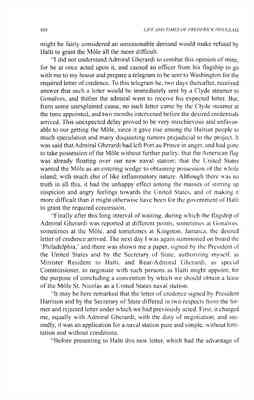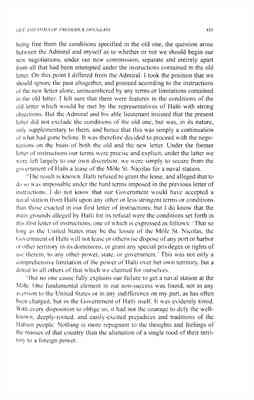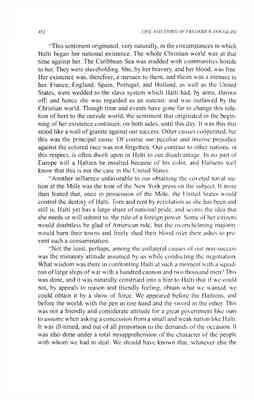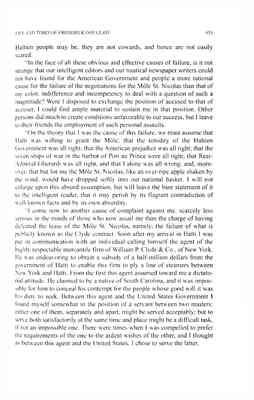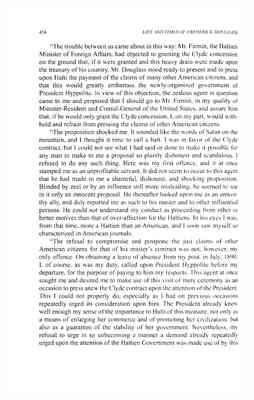Pages
76
450 LIFE AND TIMES OF FREDERICK DOUGLASS
might be fairly considered an unreasonable demand would make refusal by Haiti to grant the Môle all the more difficult.
"I did not understand Admiral Gherardi to combat this opinion of mine, for he at once acted upon it, and caused an officer from his flagship to go with me to my house and prepare a telegram to be sent to Washington for the required letter of credence. To this telegram he, two days thereafter, received answer that such a letter would be immediately sent by a Clyde steamer to Gonaïves, and thither the admiral went to receive his expected letter. But, from some unexplained cause, no such letter came by the Clyde steamer at the time appointed, and two months intervened before the desired credentials arrived. This unexpected delay proved to be very mischievous and unfavorable to our getting the Môle, since it gave rise among the Haïtian people to much speculation and many disquieting rumors prejudicial to the project. It was said that Admiral Gherardi had left Port au Prince in anger, and had gone to take possession of the Môle without further parley; that the American flag was already floating over our new naval station; that the United States wanted the Môle as an entering wedge to obtaining possession of the whole island; with much else of like inflammatory nature. Although there was no truth in all this, it had the unhappy effect among the masses of stirring up suspicion and angry feelings towards the United States, and of making it more difficult than it might otherwise have been for the governmcnt of Haïti to grant the required concession.
"Finally after this long interval of waiting, during which the flagship of Admiral Gherardi was reported at different points, sometimes at Gonaïves, sometimes at the Môle, and sometimes at Kingston, Jamaica, the desired letter of credence arrived. The next day I was again summoned on board the 'Philadelphia,' and there was shown me a paper, signed by the President of the United States and by the Secretary of State, authorizing myself, as Minister Resident to Haïti, and Rear-Admiral Gherardi, as special Commissioner, to negotiate with such persons as Haïti might appoint, for the purpose of concluding a convention by which we should obtain a lease of the Môle St. Nicolas as a United States naval station.
"It may be here remarked that the letter of credence signed by President Harrison and by the Secretary of State differed in two respects from the former and rejected letter under which we had previously acted. First, it charged me, equally with Admiral Gherardi, with the duty of negotiation; and secondly, it was an application for a naval station pure and simple, without limitation and without conditions.
"Before presenting to Haïti this new letter, which had the advantage of
77
LIFE AND TIMES OF FREDERICK DOUGLASS 451
being free from the conditions specified in the old one, the question arose between the Admiral and myself as to whether or not we should begin our new negotiations, under our new commission, separate and entirely apart from all that had been attempted under the instructions contained in the old letter. On this point I differed from the Admiral. I took the position that we should ignore the past altogether, and proceed according to the instructions of the new letter alone, unincumbered by any terms or limitations contained in the old letter. I felt sure that there were features in the conditions of the old letter which would be met by the representatives of Haïti with strong objections. But the Admiral and his able lieutenant insisted that the present letter did not exclude the conditions of the old one, but was, in its nature, only supplementary to them. and hence that this was simply a continuation of what had gone before. It was therefore decided to proceed with the negotiations on the basis of both the old and the new letter. Under the former letter of instructions our terms were precise and explicit; under the latter we were left largely to our own discretion; we were simply to secure from the government of Haïti a lease of the Môle St. Nicolas for a naval station.
"The result is known. Haïti refused to grant the lease, and alleged that to do so was impossible under the hard terms imposed in the previous letter of instructions. I do not know that our Government would have accepted a naval station from Haïti upon any other or less stringent terms or conditions than those exacted in our first letter of instructions; but I do know that the main grounds alleged by Haïti for its refusal were the conditions set forth in this first letter of instructions, one of which is expressed as follows: 'That so long as the United States may be the lessee of the Môle St. Nicolas, the Government of Haïti will not lease or otherwise dispose of any port or harbor or other territory in its dominions, or grant any special privileges or rights of use therein, to any other power, state, or government." This was not only a comprehensive limitation of the power of Haïti over her own territory, but a denial to all others of that which we claimed for ourselves.
"But no one cause fully explains our failure to get a naval station at the Môle. One fundamental element in our non-success was found, not in any aversion to the United States or in any indifference on my part, as has often been charged, but in the Government of Haïti itself. It was evidently timid. With every disposition to oblige us, it had not the courage to defy the wellknown, deeply-rooted and easily-excited prejudices and traditions of the Haïtien people. Nothing is more repugnant to the thoughts and feelings of the masses of that country than the alienation of a single rood of their territory to a foreign power.
78
452 LIFE AND TIMES OF FREDERICK DOUGLASS
"This sentiment originated, very naturally, in the circumstances in which Haïti began her national existence. The whole Christian world was at that time against her. The Caribbean Sea was studded with communities hostile to her. They were slaveholding. She, by her bravery, and her blood, was free. Her existence was, therefore, a menace to them, and theirs Was a menace to her. France, England, Spain, Portugal, and Holland, as well as the United States, were wedded to the slave system which Haïti had, by arms, thrown off; and hence she was regarded as an outcast, and was outlawed by the Christian world. Though time and events have gone far to change this relation of hers to the outside world, the sentiment that originated in the beginning of her existence continues, on both sides, until this day. It was this that stood like a wall of granite against our success. Other causes cooperated, but this was the principal cause. Of course our peculiar and intense prejudice against the colored race was not forgotten. Our contrast to other nations, in this respect, is often dwelt upon in Haïti to our disadvantage. In no part of Europe will a Haïti be insulted because of his color, and Haïtiens well know that this is not the case in the United States.
"Another influence unfavorable to our obtaining the co\eted naval station at the Môle was the tone of the New York press on the subject. It more than hinted that, once in possession of the Môle, the United States would control the destiny of Haïti. Torn and rent by revolution as she has been and still is, Haïti yet has a large share of national pride, and scorns the idea that she needs or will submit to, the rule of a foreign power. Some of her citizens would doubtless be glad of American rule, but the overwhelming majority would burn their towns and freely shed their blood over their ashes to prevent such a consummation.
"Not the least, perhaps. among the collateral causes of our non-success was the minatory attitude assumed by us while conducting the negotiation. What wisdom was there in confronting Haïti at such a moment with a squadron of large ships of war with a hundred cannon and two thousand men? This was done, and it was naturally construed into a hint to Haïti that if we could not, by appeals to reason and friendly feeling, obtain what we wanted, we could obtain it by a show of force. We appeared before the Haïtiens, and before the world, with the pen in one hand and the sword in the other. This was not a friendly and considerate attitude for a great government like ours to assume when asking a concession from a small and weak nation like Haïti. It was ill-timed, and out of all proportion to the demands of the occasion. It was also done under a total misapprehension of the character of the people with whom we had to deal. We should have known that, whatever else the
79
LIFE AND TIMES OF FREDERICK DOUGLASS 453
Haïtien people may be, they are not cowards, and hence are not easily scared.
"In the face of all these obvious and effective causes of failure, is it not strange that our intelligent editors and our nautical newspaper writers could not have found for the American Government and people a more rational cause for the failure of the negotiations for the Môle St. Nicolas than that of my color, indifference and incompetency to deal with a question of such a magnitude? Were I disposed to exchange the position of accused to that of accuser, I could find ample material to sustain me in that position. Other persons did much to create conditions unfavorable to our success, but I leave to their friends the employment of such personal assaults.
"On the theory that I was the cause of this failure, we must assume that Haïti was willing to grant the Môle; that the timidity of the Haïtien Government was all right; that the American prejudice was all right; that the seven ships of war in the harbor of Port au Prince were all right; that RearAdmiral Gherardi was all right, and that I alone was all wrong; and, moreover, that but for me the Môle St. Nicolas, like an over-ripe apple shaken by the wind, would have dropped softly into our national basket. I will not enlarge upon this absurd assumption, but will leave the bare statement of it to the intellegent reader, that it may perish by its flagrant contradiction of well-known facts and by its own absurdity.
"I come now to another cause of complaint against me, scarcely less serious in the minds of those who now assail me than the charge of having defeated the lease of the Môle St. Nicolas, namely, the failure of what is publicly known as the Clyde contract. Soon after my arrival in Haïti I was put in communication with an indi,idual calling himself the agent of the highly respectable mercantile firm of William P. Clyde & Co., of New York. He was endeavoring to obtain a subsidy of a half-million dollars from the government of Haïti to enable this firm to ply a line of steamers between New York and Haïti. From the first this agent assumed toward me a dictatorial attitude. He claimed to he a native of South Carolina, and it was impossible for him to conceal his contempt for the people whose good will it was his duty to seek. Between this agent and the United States Government I found myself somewhat in the position of a servant between two masters; either one of them, separately and apart, might be served acceptably; but to serve both satisfactorily at the same time and place might be a difficult task, if not an impossible one. There were times when I was compelled to prefer the requirements of the one to the ardent wishes of the other, and I thought as between this agent and the United States. I chose to serve the latter.
80
454 LIFE AND TIMES OF FREDERICK DOUGLASS
"The trouble between us came about in this way: Mr. Firmin, the Haïtien Minister of Foreign Affairs, had objected to granting the Clyde concession on the ground that, if it were granted and this heavy drain were made upon the treasury of his country, Mr. Douglass stood ready to present and to press upon Haïti the payment of the claims of many other American citizens, and that this would greatly embarrass the newly-organized government of President Hyppolite. In view of this objection, the zealous agent in question came to me and proposed that I should go to Mr. Firmin, in my quality of Minister-Resident and Consul-General of the United States, and assure him that, if he would only grant the Clyde concession, I, on my part, would withhold and refrain from pressing the claims of other American citizens.
"The proposition shocked me. It sounded like the words of Satan on the mountain, and I thought it time to call a halt. I was in favor of the Clyde contract, but I could not see what I had said or done to make it possible for any man to make to me a proposal so plainly dishonest and scandalous. I refused to do any such thing. Here was my first offence, and it at once stamped me as an unprofitable servant. It did not seem to occur to this agent that he had made to me a shameful, dishonest, and shocking proposition. Blinded by zeal or by an influence still more misleading, he seemed to see in it only an innocent proposal. He thereafter looked upon me as an unworthy ally, and duly reported me as such to his master and to other influential persons. He could not understand my conduct as proceeding from other or better motives than that of over-affection for the Haïtiens. In his eyes I was, from that time, more a Haïtien than an American, and I soon saw myself so characterized in American journals.
"The refusal to compromise and postpone the just claims of other American citizens for that of his master's contract was not, however, my only offence. On obtaining a leave of absence from my post, in July, 1890, I, of course, as was my duty, called upon President Hyppolite before my departure, for the purpose of paying to him my respects. This agent at once sought me and desired me to make use of this visit of mere ceremony as an occasion to press anew the Clyde contract upon the attention of the President. This I could not properly do, especially as I had on previous occasions repeatedly urged its consideration upon him. The President already knew well enough my sense of the importance to Haïti of this measure, not only as a means of enlarging her commerce and of promoting her civilization, but also as a guarantee of the stability of her government. Nevertheless, my refusal to urge in so unbecoming a manner a demand already repeatedly urged upon the attention of the Haïtien Government was made use of by this
